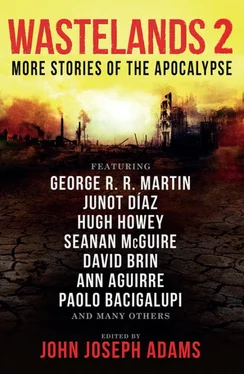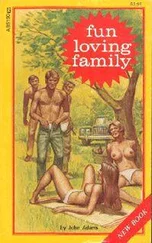Hope returns, carrying a bubble of sleek white plastic that fills her bare arms. The bubble has no seams. No mold sticks to it, no sand. Carefully she lays the thing on my cot.
Despite myself, I say, “Bring me the big knife and be very careful, it’s sharp.”
She gets the knife, carrying it as gingerly as an offering for the altar. The plastic slits more readily than I expected. I peel it back, and we both gasp.
I am the oldest person on Island by two decades, and I have seen much. Not of the world my father told me about, from before the Crash, but in our world now. I have buried two husbands and five children, survived three great sandstorms and two years where the rains didn’t come at all, planted and first-nursed a sacred tree, served six times at the altar. I have seen much, but I have never seen so much preserved sin in one place.
“What… Grandma… what is that?”
“A book, child. They’re all books.”
“Books?” Her voice holds titillated horror. “You mean… like they made before the Crash? Like they cut down trees to make?”
“Yes.”
“Trees? Real trees ?”
“Yes.” I lift the top one from the white plastic bubble. Firm, thick red cover, like… dear God, it’s made from the skin of some animal. My gorge rises. Hope mustn’t know that. The edges of the sin are gold. My father told me about books, but not that they could look like this. I open it.
“Oh!” Hope cries. “Oh, Grandma!”
The first slate—no, first page , the word floating up from some childhood conversation—is a picture of trees, but nothing like the pictures children draw on their slates. This picture shows dozens of richly colored trees, crowded together, each with hundreds of healthy, beautifully detailed green leaves. The trees shade a path bordered with glorious flowers. Along the path runs a child wearing far too many wraps, following a large white animal dressed in a wrap and hat and carrying a small metal machine. At the top of the picture, words float on golden clouds: Alice in Wonderland .
“Grandma! Look at the—Mama’s coming!”
Before I can say anything, Hope grabs the book, shoves it into the white bubble, and thrusts the whole thing under my cot. I feel it slide under my bony ass, past the sag that is my body, and hit the wall. Hope is standing up by the time Gloria crowds into my tiny room.
“Hope, have you fed the chickens yet?”
“No, Mama, I—”
Gloria reaches out and slaps her daughter. “Can’t I trust you to do anything?”
“Please, Gloria, it’s my fault. I sent her to see if there’s any more mint growing in the dell.”
Gloria scowls. My daughter-in-law is perpetually angry, perpetually exhausted. Before my legs gave out and I could still do a full day’s work, I used to fight back. The Island is no more arid, the see-oh-too no higher, for Gloria than for anyone else. She has borne no more stillborn children than have other women, has endured no more soot clouds. But now that she and my son must feed my nearly useless body, I try to not anger her too much, to not be a burden. I weave all day. I twist rope, when there are enough vines to spare for rope. I pretend to be healthier than I am.
Gloria says, “We don’t need mint, we need fed chickens. Go, Hope.” She turns.
“Gloria—”
“What?” Her tone is unbearable. I wonder, for the thousandth time, why Bill married her, and for the thousandth time I answer my own question.
“Nothing,” I say. I don’t tell her about the sin under the bed. I could have, and ended it right there. But I do not.
God forgive me.
* * *
Gloria stands behind the altar, dressed in the tattered green robe we all wear during our year of service. I sit on a chair in front of the standing villagers; no one may miss services, no matter how old or sick or in need of help to hobble to the Grove. Bill half carried me here, afraid no doubt of being late and further angering his wife. It’s hard to have so little respect for my son.
It is the brief time between the dying of the unholy wind that blows all day and the fall of night. Today the clouds are light gray, not too sooty, but not bearing rain, either.
The altar stands at the bottom of the dell, beside the spring that makes our village possible. A large flat slab of slate, it is supported by boulders painstakingly chiseled with the words of God. It took four generations to carve that tiny writing, and three generations of children have learned to read by copying the sacred texts onto their slates. I was among the first. The altar is shaded by the six trees of the Grove and from my uncomfortable seat, I can gaze up at their branches against the pale sky.
How beautiful they are! Ours are the tallest, straightest, healthiest trees of any village on Island. I planted and first-nursed one of them myself, the honor of my life. Even now I feel a thickness in my shriveled chest as I gaze up at the green leaves, each one wiped free of dust every day by those in service. Next year, Hope will be one of them. There is nothing on Earth lovelier than the shifting pattern of trees against the sky. Nothing.
Gloria raises her arms and intones, “‘Then God said, “I give you every plant and every tree on the whole Earth. They will be food for you.”’”
“Amen,” call out two or three people.
“‘Wail, oh pine tree,’” Gloria cries, “‘for the cedar has fallen, the stately trees are ruined! Wail, oaks—’”
“Wail! Wail!”
I have never understood why people can’t just worship in silence. This lot is sometimes as bad as a flock of starlings. “—oaks of Bashan, the—”
Hope whispers, “Who’s Bashan?”
Bill whispers back, “A person at the Crash.”
“‘—dense forest has been cut down! And they were told—told!—not to harm the grass of Earth or any plant or tree.’”
Revelation 9:4 , I think automatically, although I never did find out what the words or numbers mean.
“‘The vine is dried up!’” Gloria cries, “‘the fig tree is withered! The pomegranate and the palm and the apple tree, all the trees of the field, are dried up! Surely the joy of mankind is withered away!’”
“Withered! Oh, amen, withered!”
Joel 1:12.
“‘Offer sacrifices and burn incense on the high places, under any spreading tree!’”
Amy Martin, one of the wailers, comes forward with the first sacrifice, an unrecognizable piece of rusted metal dug up from the soil or washed up on the beach. She lays it on the altar. Beside me Hope leans forward, her mouth open and her eyes wide. I can read her young thoughts as easily as if they, too, are chiseled in stone: That metal might have been part of a “car” that threw see-oh-two and soot into the air, might have been part of a “factory” that poisoned the air, might have even been part of a “saw” that cut down the forests! Hope shudders, but I glance away from the intensity on her face. Sometimes she looks too much like Gloria.
Two more sacrifices are offered. Gloria takes an ember from the banked fire under the altar—the only fire allowed in the village—and touches it briefly to the sacrifices. “‘Instead of the thornbush will grow the pine tree, and instead of briars the myrtle will grow. This will be for the Lord’s glory, for an everlasting sign which—’”
I stop listening. Instead I watch the leaves move against the sky. What is “myrtle”—what did it look like, why was it such a desirable plant? The leaves blur. I have dozed off, but I realize this only when the whole village shouts together, “We will never forget!” and services are over.
Bill carries me back through the quickening darkness without stars or moon. Without the longed-for rain. Without the candles I remember from my childhood on Island, or the dimly remembered (dreamed?) fireless lights from before that. There are no lights after dark on Island, nothing that might release soot into the air.
Читать дальше












